|
| A man of
interesting personality and eclectic activities, Gino Vecchi was born on
the 10th August 1915, the bright day dedicated to St. Lawrence,
at Albinea close to Reggio Emilia and belongs to the unlucky generation
living between the dramas of two World Wars.
|

|
|
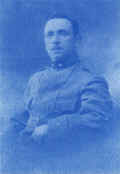
|
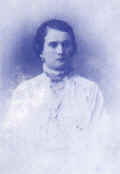
|
When he was just
about two years old, he missed tragically both his father, a promising sea
captain, fallen at the Austro-Italian battle front on the hills around
Bassano del Grappa and his young mother unable to survive to her spouse
after such a big grief. He has grown up in the country of the Po green
valley, under the spell of the sea understood as a way of communication
between peoples.
|
| He was equally
sharing his passion for classical and scientific studies with particular
interests in the radio which, at the beginning of the century, was
considered as a symbol of progress once he cycled to Rimini to watch the
sea for the first time when he was aged about fifteen.
|
|
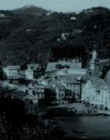
|
After this first
approach he would had then been living long times in far coastal places
and remote islands (such as Pianosa, Portofino, Rhodes, Tilos,
Kastellorizo, Crete, Sottomarina, Venice, Capri, Massawa, Buenos Aires,
Ushuaia), but in particular all along the shores of Liguria.
|
| He was called up in
the navy spending long time of the service mainly sailing the
Mediterranean on board of submarines, boast of the Italian fleet, participating
to certain maritime campaigns in the middle between the two main World
Wars. The leave, however, was too short indeed since he was recalled to
the navy upon the World War Two broke out.
|
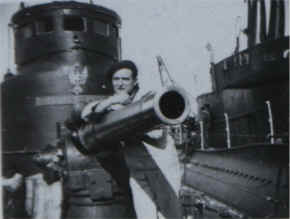
|
| No fitted with
radars or modern telecommunication devices nowadays used in shipping, at
that time the coastal defence system was applying to traditional
equipments like optical look-out towers mainly located on the top of sharp
rocky promontories, true inaccessible hermitages and "islands"
inside the islands.
|
| So, he has been
destined to the top of a hill in a locality called Tsampika in the island
of Rhodes, formerly an ancient pagan temple and then a Christian monastery, and also to the lonely island of
Tilos.
|
| It was absolutely
necessary to be a good climber, to be respectful of the nature and to be
spiritually oriented, in order to face that kind of life, all endowments
belonging to Gino Vecchi who found there a great opportunity to study the
stories of the Knights of Rhodes.
|
|
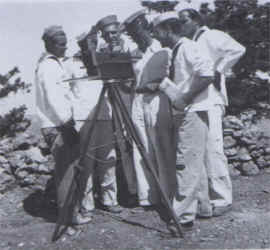
|
Communications at
look-out posts were still exchanged mainly by using flags or semaphoric
signaling equipments such as the heliograph, an optical instrument
reflecting the sun's light.
|
| He was particularly
skilled in using it so that he earned a praise the day, from the top of
Mount Vigla, he communicated with and saved from falling surely a pray of
the British fleet an Italian merchant convoy which inadvertently ignored
the sharp edge of Kastellorizo island confused with the prevailing
Anatolian coastline.
|
| At that time,
Kastellorizo was the most exposed extreme eastern island of the Italian
dominion in the Aegean sea (an ancient trading outpost en route from
Venice and Constantinople to the Middle East).
|
The island of Kastellorizo was an easy conquest now by the British armed forces detached
eastwards in the close island of Cyprus, now by the Italian armed forces
detached westwards in the island of Rhodes.
|
| Landed in quality
of responsible of the local naval signal station after the further
re-conquest by the Italians of this island whose current name in Greek
spelling is anyway derived by a chewed pronunciation of the original name of
Castelrosso (Red Castle) given by Venetian merchants, Kastellorizo was
significant in the life of Gino Vecchi (Kastellorizo enjoyed of new popularity
within the international tourist network in early 90s after the film
"Mediterraneo" has been the winner of the
Oscar).
|
|
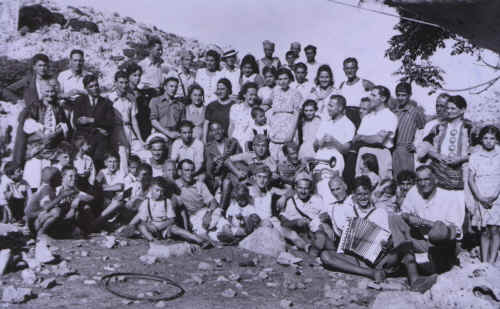
|
| Peaceful and of
good character, he was attracted by the culture of the local people, heirs
of such an ancient Hellenic civilization, without any conquering attitude.
|
| Kastellorizo was
for him a further important occasion for cultural exchanges and studies
and the plain living in the island was very similar to the one described
in the novel The Sagapò Army by the writer Renzo Biasion.
|
| At the end, by a
magnificent ceremony full of cooperation symbols between the two ethnic
groups, he gets married to the beautiful daughter of the Secretary of the
Delegation (a public office in the dominion similar to nowadays' one of Mayor)
and man with wide range of culture as well.
|
| When the date of
the 8th September 1943 fatally came for him too, it's him
finally to haul down forever the Italian flag from the fortress of
Monolithos, a self-descriptive place-name of an inner location in the isle
of Rhodes. |
|
|

